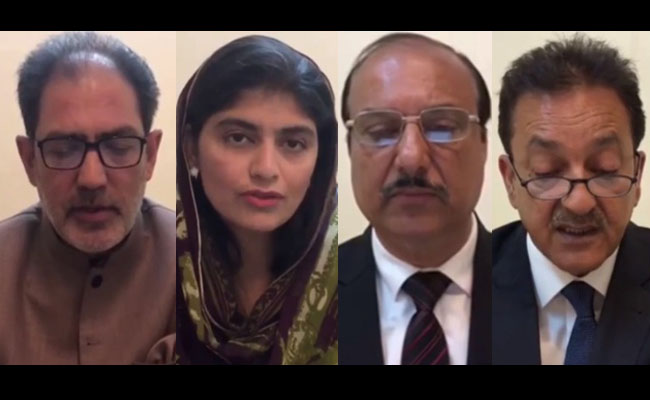Kashmiri Delegation members while taking part in 28 meeting of 46th session of United Nations Human Rights Council via Video Interventions.
Altaf Hussain Wani Speaking on behalf of World Muslim Congress (WMC) stated “The UNSC resolutions and the promises made by India on the right to self-determination of people of disputed state of Jammu and Kashmir is a challenge to the international community and democratic systems. Indian state not only denied them their right but resorted to worst undemocratic, colonial and authoritarian measures. Instead of valuing the democratic norms of people, Indian State Terrorism set new lows of human rights abuses, and atrocities. Killings, torture, abduction, rapes, harassment and pelleting is the new normal in Indian Occupied Kashmir. He urged council to establish a commission of inquiry as recommended by the High commissioner in 2018 Kashmir Report to investigate the ongoing and past human rights violations.
Syed Faiz Naqshbandi Speaking on behalf of Community of Human Rights and Advocacy Centre Stated Indian forces crackdown on all the spaces of political engagement, caging and locking up of Kashmiri leadership, shutting down free media and press is open manifestation of their denial of right to self-determination to Kashmiris. India’s continued state suppression and killing spree manifests that has never paid any heed to the appeal of international bodies and always undermines their legitimacy and looked down upon; which is a serious threat to international norms and democratic system.
Sardar Amjad Yousaf Khan Speaking on behalf of International Action for Peace & Sustainable Development stated “States commit human rights violations either directly or indirectly. When a state engages in these violations, the rights such as the right to a fair trial will also be violated. It is obligatory to a government to protect, respect its people and fulfil its human rights”.
He urged the council to monitor Indian government’s track records regarding human rights.
Dr. Saria Shah Speaking on behalf of African Commission of Health and Human Rights Promoters (CAPSHD) said “Journalism has become risky in Indian Occupied Kashmir (IOK). Indian Investigating Agency (NIA) crackdowns on the offices and homes of journalists and Human Rights defenders and Introduction of laws like UAPA to suppress free speech and dissent in the IOK.
Dr Saria urged the council to step in and take measures to address this grave situation”.
